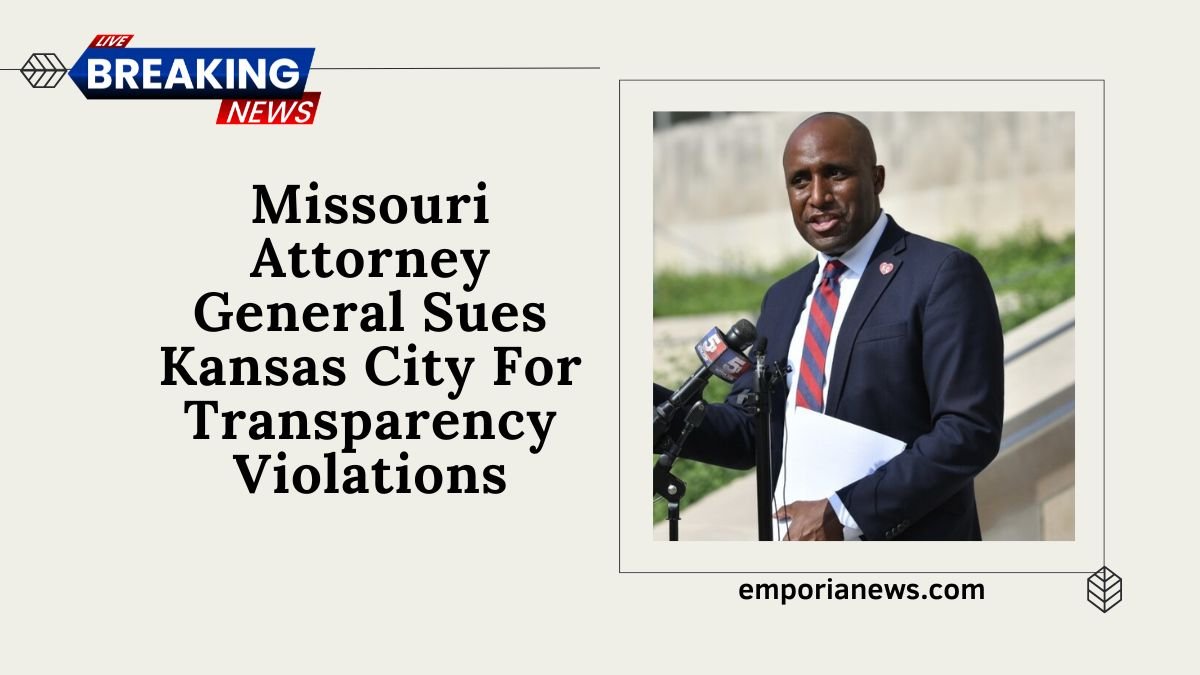The ongoing tension between Missouri’s top legal office and Kansas City officials escalated this week, as the Missouri Attorney General filed a lawsuit against Kansas City for alleged violations of the state’s Sunshine Law.
At the center of the legal action is the city’s failure to provide public records regarding legal expenditures, raising concerns about transparency, accountability, and taxpayer oversight.
What Sparked the Lawsuit?
On March 3, 2025, the Attorney General’s office submitted formal requests under Missouri’s Sunshine Law seeking detailed financial records and billing statements related to Kansas City’s use of outside legal counsel.
According to legal protocol, a public entity must:
- Respond within three business days
- Provide access to the records
- Or give a valid reason and estimated timeline for delay
The city initially acknowledged the request, stating that a cost estimate for fulfilling the document retrieval would be delivered within 15 days. However, 40 days later, there had been no further updates or release of the requested documents.
Legal Allegations
The lawsuit accuses Kansas City of:
- Failing to meet required response timelines
- Not providing a cost estimate or status update
- Denying the public’s right to inspect financial records
- Blocking transparency regarding public spending on external legal services
The Attorney General emphasized that elected officials are not above the law and called for full disclosure on how millions in taxpayer funds are being used, particularly in relation to politically sensitive legal efforts.
Accusations and Political Backdrop
The Attorney General’s complaint highlights that the lawsuit seeks to uncover how Kansas City funds outside legal representation, particularly concerning controversial cases where taxpayer money may be used to support political agendas.
The Attorney General asserts that public officials must answer how much is being spent and why, especially when those expenditures are used to challenge state policies or directives.
Kansas City’s Reaction
Kansas City leadership has criticized the lawsuit as politically motivated, labeling it a continuation of a broader campaign to target city officials. While denying wrongdoing, city representatives have indicated that they are not opposed to releasing the records but would prefer to avoid costly litigation.
They maintain that Sunshine Law requests are not handled personally by elected officials, and that the city is willing to comply—despite disputes about the intent behind the request.
Key Details of the Dispute
| Item | Details |
|---|---|
| Date of Original Request | March 3, 2025 |
| Deadline for Estimate | Within 15 days (missed) |
| Records Requested | Receipts, billing statements, legal contracts |
| Response Received? | No documentation received after initial reply |
| Legal Action Filed | April 2025 |
| Filed By | Missouri Attorney General’s Office |
| Alleged Violation | Failure to comply with Sunshine Law timelines |
Why Transparency Matters
This lawsuit brings renewed attention to the importance of open government. Missouri’s Sunshine Law is designed to:
- Give citizens access to government operations
- Prevent misuse of public funds
- Promote trust in institutions
If cities and public bodies fail to comply, it weakens public confidence and opens the door to unchecked spending and mismanagement.
What Could Happen Next?
If the court finds that Kansas City violated the Sunshine Law:
- The city may be ordered to release the records
- Civil penalties could be imposed
- Officials responsible for the delay may face further scrutiny
Additionally, the case may set a legal precedent for how other public entities handle record requests, especially those involving politically sensitive topics.
The lawsuit against Kansas City reflects broader concerns about government accountability, responsible spending, and access to information. As legal proceedings move forward, the outcome could influence how public institutions across the state respond to requests for transparency.
With millions in taxpayer dollars and public trust at stake, this case is likely to be closely watched—and widely impactful.




